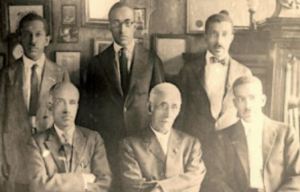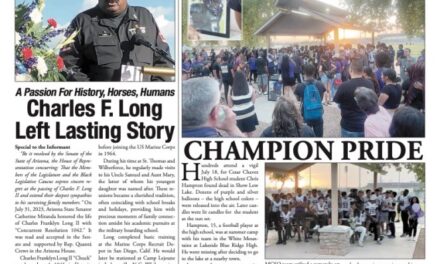
By Micha Green
AFRO D.C. and Digital Editor
mgreen@afro.com
According to the National Center for Educational Statistics (NCES), in 1890, 56.8 of Black or Colored Americans were illiterate, with the definition of literacy at that time referring to solely basic reading and writing skills. In 1892, the AFRO came to be. With the audacity to hope that the small percentage of Black Baltimoreans would read his work, AFRO Publisher John H. Murphy Sr., widely credited for founding the almost 130 year organization, dared to dream. Born into slavery and becoming a soldier, later in life Murphy started a legacy of unapologetically relaying news critical to Black history, communities and current culture.
“The things that I find to be most remarkable about his story is that he was born enslaved, that he literally fought for his freedom in the Civil War and that he started this business when he was older, as an older man,” said AFRO Archivist and AFRO Charities Director Savannah Wood, who shared Murphy’s life and history as it related to AFRO and racist world to which he was born.
“Essentially the generation coming out of slavery had to reinvent themselves completely. And it didn’t stop. We have this conception that people find their passion and life’s goal at an early age, and then do it, and that might’ve been the case for the second generation, but for him, he really had to reinvent himself from being a slave, to then being a soldier, to then a publisher of this paper,” Wood emphasized.
Though founded in 1892, Murphy initially worked for the paper’s printing press and didn’t officially take over the AFRO until five years later.
“There is some discrepancy about the founding,” Wood explained. “My understanding is that he was involved since 1892, but didn’t own it until 1897. In terms of firsts, he’s the first Murphy that is now six generations deep in leadership.”
The AFRO’s current publisher is the Rev. Dr. Frances “Toni” Murphy Draper, Murphy’s great-granddaughter, and filled with his descendants serving as staff and on the Board, such as Wood, who is a fifth generation Murphy.

With low literacy rates among African Americans in the 1890s, Murphy ventured into the world of the Black Press and publishing.
“I’m thinking about the audacity of it. And of course the Black Press existed before the AFRO existed, so there’s precedent for him to do it, it’s not like he’s coming up with this idea on his own. But there had been other Black newspapers in Baltimore that had failed, in fact, the AFRO was a failing newspaper when he took it over. That’s why it was available, because it had failed, essentially, and was for sale,” Wood explained.
The multifaceted archivist and AFRO Charities director said that in researching the Black Press, she contends Murphy likely decided to take over the AFRO in order to ensure the truth about Black life was revealed to African-American communities not only then, but for future generations like now, who can use the news then as a blueprint and insight on happenings today.
“The Black press was founded exclusively to represent Black people and never have the fallacy of objectivity as its goal, but rather was meant specifically to tell the truth about Black people and for Black people and to advocate on our behalf,” Wood said passionately.
Wood also emphasized that Murphy could not have taken over the AFRO in 1897 had it not been for the financial and loving support of his wife, Martha Howard Murphy.
“Don’t forget about Martha,” Wood said. “That’s my side passion project: to make sure she’s always brought up when he’s mentioned, because it wouldn’t have been possible without her.”
Legend has it that Martha Murphy loaned her husband the $200 necessary for him to purchase the AFRO.
“I think about, not only the $200, but she birthed all of the children that would become the workforce and they had a house to live in because her father bought them a house. So she came with the resources, basically, to be able to support her husband’s dream essentially.
The Murphys’ original contributions to journalism in the late nineteenth century continue to live on today, not only through the AFRO’s 130 year legacy, but through the maintained necessity of the Black Press as well as the constant push for African American reporters and storytellers represented in mainstream media.
In 2008, John H. Murphy Sr. was added to the Maryland, Delaware, D.C. (MDDC) Press Association Hall of Fame.
Help us Continue to tell OUR Story and join the AFRO family as a member – subscribers are now members! Join here!
The post The reinvention of John H. Murphy Sr.: From slave to soldier to publisher appeared first on AFRO American Newspapers .











